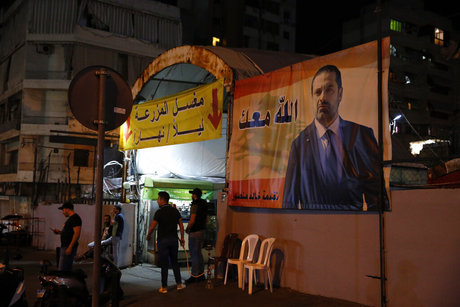BEIRUT (Reuters)- Saad al-Hariri resigned as Lebanon’s prime minister on Tuesday, declaring he had hit a “dead end” in trying to resolve a crisis unleashed by huge protests against the ruling elite and plunging the country deeper into turmoil. Hariri addressed the nation after a mob loyal to the Shi’ite Muslim Hezbollah and Amal movements attacked and destroyed a protest camp set up by anti-government demonstrators in Beirut. It was the most serious strife on the streets of Beirut since 2008, when Hezbollah fighters seized control of the capital in a brief eruption of armed conflict with Lebanese adversaries loyal to Hariri and his allies at the time. Hariri’s resignation on Tuesday points to rising political tensions that may complicate the formation of a new government capable of tackling Lebanon’s worst economic crisis since its 1975-90 civil war.

Hariri ‘Relieved’ after Resignation as Mufti Calls It a ‘Positive Shock
by naharnet.com — As soon as Prime Minister Saad Hariri announced his resignation, popular delegations, dignitaries, clerics, former prime ministers, incumbent ministers and al-Mustaqbal Movement MPs from different areas flocked to the Center House to express their support for his decision to resign. The visitors included former PMs Tamam Salam and Fouad Saniora, Grand Mufti Sheikh Abdul Latif Daryan and the ministers Raya al-Hassan, Mohammed Choucair, Adel Afiouni and Jamal Jarrah. Hariri told his visitors: “I just want to say: May God protect Lebanon and we hope to get out of this impasse and we hope that the country will be fine.” He said he was relieved because the resignation was in response to what the people wants, and said: “We will all stay together.” Mufti Daryan expressed his solidarity with Hariri’s stance. He said: “Premier Hariri’s resignation puts all officials before their historical and national responsibilities to preserve Lebanon’s stability and security, the dignity of the Lebanese people and their decent living.” He added: “The resignation of Prime Minister Hariri represents a positive shock to all the officials and the Lebanese to agree on solutions that take the country out of the deadlocks and crises from which the Lebanese suffer.”

What’s Next after Hariri’s Resignation
by AP — The resignation of Prime Minister Saad Hariri on Tuesday meets a key demand of Lebanon’s anti-government protesters but will also plunge the country into even greater uncertainty, with no clear path to resolving its growing economic and political crisis.
THE BACKGROUND
The political settlement that ended Lebanon’s 1975-1990 civil war distributes power and top offices among the country’s Shiites, Sunnis and Christians. The complex sectarian system has mostly kept the peace, but it has made major decisions extremely difficult and contributed to long periods of political gridlock. The Western-backed Hariri had served in a national unity government dominated by rival factions allied with the militant Hizbullah group, whose supporters attacked the main protest camp in central Beirut on Tuesday. He had proposed the creation of an emergency Cabinet made up of a small group of technocrats to steer the country toward necessary reforms, but his governing partners refused. A point of dispute emerged over Foreign Minister Jebran Bassil, the son-in-law of President Michel Aoun. The protesters have trained much of their vitriol on the two men, who are allied with Hizbullah, but Aoun has reportedly insisted on remaining in office and keeping Bassil in his post. Hizbullah, which has three ministers in the government, has stuck by its allies and was opposed to Hariri’s decision to resign.
WHAT HAPPENS NEXT
If he accepts his resignation, Aoun will task the now-resigned government to continue in a caretaker capacity. Under the constitution, he then has to hold binding consultations with the heads of parliamentary blocs to ask them for their choice of a new prime minister. He could then appoint Hariri or another individual from the Sunni community to form a government. In Lebanon’s system, the presidency is reserved for a Christian, the prime minister is Sunni and the parliament speaker is Shiite. Aoun has the right in principle to reject Hariri’s resignation, but he could then refuse to call for Cabinet meetings. The process of forming a new Lebanese government typically takes several months. It took Lebanon’s factions 2 ½ years to agree on the current president, and it took nine months to form Hariri’s now-embattled government. This time, however, the country is in the grip of a severe economic crisis that has only worsened since the protests began, with banks, schools and businesses having been closed for two weeks.
ROCKY PATH AHEAD
Political tensions also are rising after Tuesday’s clashes. “In this context, it is incredibly difficult to see them agreeing on any one new name,” said Maha Yahya, director of the Carnegie Middle East Center. That would leave Hariri in place as head of a caretaker government. “His capacity to address the economic crisis and possible economic and financial collapse will be curtailed even more,” Yahya said. “A devaluation of the Lebanese pound will likely lead to even more social unrest and turbulence on the street.” The protesters have adamantly rejected the entire political class, calling for overthrow of the postwar regime. Acquiescing to those demands would essentially require those who have led the country for three decades to legislate themselves out of existence. The leaders reject that.



